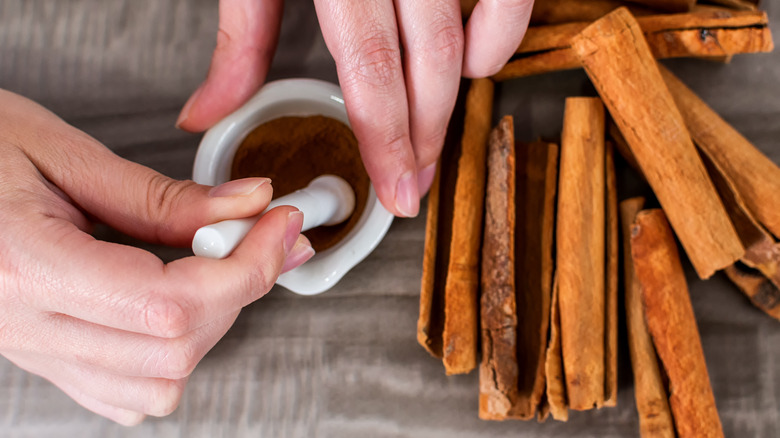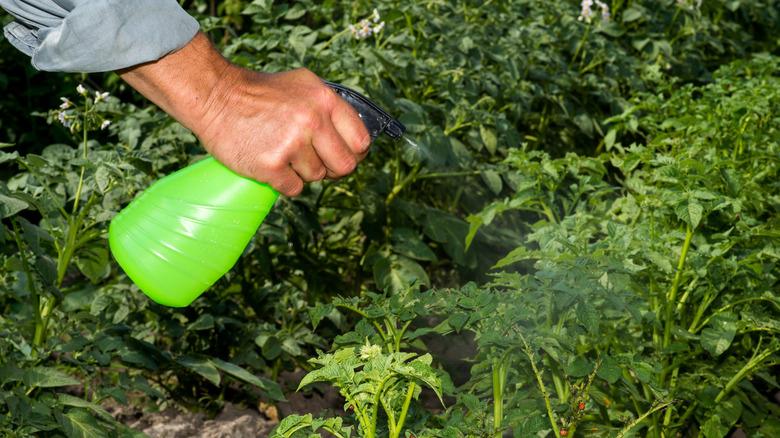A common plant pest you might have come across if you have a vegetable garden is the sap-sucking aphid. The peach-potato aphid is oval-shaped, growing up to about 2mm, and varying in color from pink and pale yellow to green. There are a number of effective home remedies to help get rid of aphids, like Epsom salt and vinegar. In this article, we will look at how to protect your peaches, potatoes, and other plants in the garden from aphids with another common kitchen ingredient — cinnamon.
You may spot peach-potato aphids on the underside of the leaves growing at the bottom of your plants, where infestations usually start. They don’t necessarily form big colonies, but an infestation can cause some damage to your produce by feeding on plants, resulting in stunted growth and a weakened crop. However, the main risk is the spread of plant diseases and viruses.
Potato leafroll is a common disease spread by aphids that stunts growth and produces brown discolourations inside the potato, reducing the overall quality of the food. Symptoms include curling leaves with a reddish-orange tinge which become brittle and turn yellow. Yellow leaves can have a significant impact on the plant’s ability to photosynthesize and feed itself. This is because yellow leaves have less of the pigment that transfers the energy absorbed from the sun to chlorophyll, resulting in a slower rate of photosynthesis.
How to use cinnamon to get rid of peach-potato aphids

Natural home remedies, like cinnamon, can be cheap and effective. They’re also an eco-friendly way to control pest problems via prevention. There are a few methods you can try when using cinnamon. The first is to place cinnamon sticks in the soil around your plants. This should help to deter insects that don’t like the potent smell of cinnamon. For a more natural look, break up cinnamon bark and add it to the soil around your plants, blending it into the environment. Alternatively, you can sprinkle cinnamon powder on the soil, ensuring you use 100% ground cinnamon and not cinnamon sugar!
To target problem areas, you can create your own pest-repellant cinnamon spray using cinnamon powder or oil. When using cinnamon powder, mix two teaspoons into four cups of warm water and let it steep overnight like a tea. Then strain the liquid and pour it into a spray bottle. When using cinnamon oil, it’s important to stick to the following ratio to avoid burning your plants: 1% cinnamon oil to 99% water. Before spraying, wipe your plants thoroughly to remove as many aphids as possible. Then spray liberally all over the plant and soil. Don’t forget the underside of the leaves and all of the stems. Try to spray evenly and get into all the crevices, but don’t drown your plant, especially when using cinnamon oil, as it is very strong. Repeat the process every two weeks.
Why is cinnamon an effective pest repellant?

Cinnamon is an inexpensive and safe home remedy for plants that are exposed to pests in the garden. When you use a natural solution like this one, you know exactly what ingredients have gone in to make it, and you can be sure that it won’t be a health hazard for you, your kids, or your pets. This is especially important when spraying plants in the garden that pets may chew on.
The main thing that makes cinnamon such an effective insect repellant is the pungent, spicy scent caused by agents cinnamaldehyde and eugenol found in cinnamon sticks, which is enough to put any bug off their leaf-shaped snack! While cinnamon acts on pests mainly as a repellent due to them being put off by the strong scent, it also has a biocidal effect in higher doses and can prevent pests from laying eggs. The cinnamon oil spray is effective in killing aphids as well as repelling them. Other insects hate the texture of cinnamon powder underfoot, which is why in powder form, cinnamon can be useful to use on patios or around raised garden beds as a barrier to stop crawling insects from getting to your plants.
